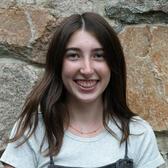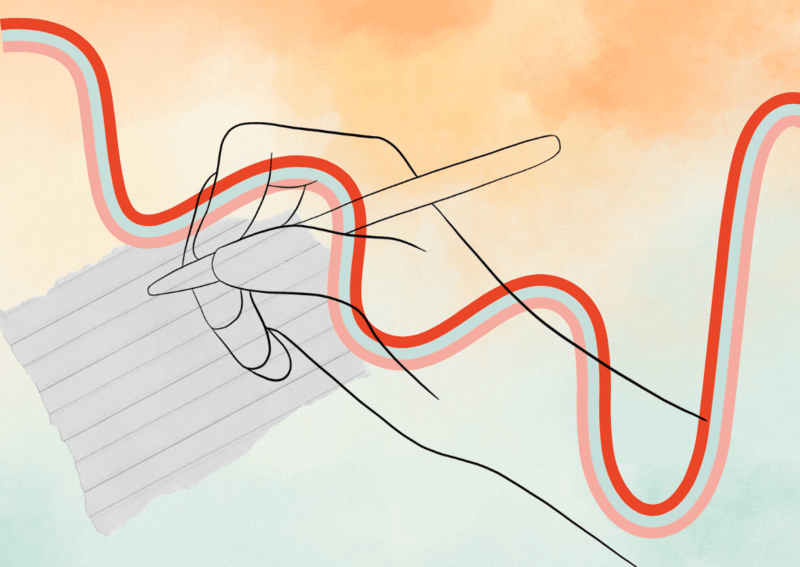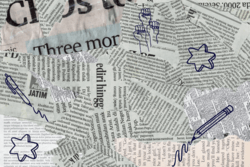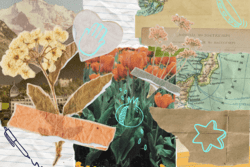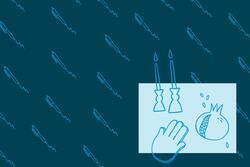Writing as a Jewish Woman: Recording, Communicating, Counting
I think I became a writer on a sticky Manhattan afternoon in my Nonna’s apartment. I was six, and I probably had wanted to be playing in Central Park. Instead, though, I was sitting beside my Nonna on her sun-faded yellow couch as she flipped through a photo-album filled with proper portraits and half-familiar smiling faces. That day I was introduced to the stories of my Nonna’s childhood in Egypt. Since then, her often repeated stories have become constants in my life, shared at every family gathering.
I know my Nonna’s favorites by heart, and I will carry her lessons with me for the rest of my life. I know, too, that these stories generally exist as oral history, passed down within my father’s family. But their value compelled me to write them down. Only through writing was it possible to capture the essence of this powerful Jewish woman in my life. Only through writing could my Nonna’s story reach a greater audience.
Below is an excerpt from a narrative I wrote in ninth grade–one of my first full pieces of personal writing. In the piece, I recount one of my Nonna’s favorite childhood stories. She always talks about how her school playground was a happy place and how it came to pass that each morning it was full of only Muslim and Jewish children playing together:
“Ok, so, you know when I was a little girl I lived in Cairo, and I went to this amazing school,” she always says in her accent that no one can quite put a finger on.
“Everyone there was so diverse. In religion, I mean. But, every morning, they had chapel.” Maybe it’s a British accent?
“Well in Cairo not everyone was Christian, and they couldn’t make Muslims and Jews go to chapel!” The accent sounds more American now, I can’t place it.
“So, everyday they would line us up outside when it was time for chapel, and the headmaster would lean slightly into the microphone and firmly bellow, ‘Muslims and Jews fall out!’”
Nonna always tries to mimic her headmaster, straightening her face in a way that’s more clownlike than serious. By the end of the story, her accent is decidedly unique, a product of living in Cairo, then England, then the U.S., and a product of learning Arabic, and Hebrew, and Italian, and French. Special, distinct, just like my Nonna.
Though this writing may not be my best or my most interesting work, I pinpoint it as the moment when I connected my passion for writing to my multifaceted identity as a Jewish woman. I treasure the story because it details a now unexpected occurrence: respect and acceptance between religious traditions in the Middle East. My Nonna’s story became my inspiration to recount others and to tell my own. And in the same way that my grandmother’s accent is decidedly indistinguishable due to the multitude of influences in her life, my identity as a writer stems from a diverse range of experiences. First and foremost though, my passion for writing is deeply connected to my Jewish womanhood.
When I think about my identity as a Jewish woman, I often picture my summer camp bunk at rest hour: feminine chaos. Imagine two girls painting their toenails on the bunk floor, five having a “shaving party” on the porch, and the rest playing card games, trading candy, or writing letters home. While I often joined in on my bunk’s rest hour activities, I also found myself writing during rest hour. Each year at camp, I kept a personal diary in which I detailed any and all of that day’s occurrences.
Camp taught me two things about writing. First, writing keeps records. When I’m feeling “campsick,” I flip through that very same diary, and I am transported back to the summer with morning flag and color war breaks. Second, writing is a tool for communication. Now in no way am I implying that frivolous tween summer diary entries or short letters to my parents (often in return for canteen candy bars) were powerfully written pieces advocating for change. However, attending Jewish summer camp taught me how to turn my thoughts, feelings, and plans for the day into concise but communicative letters home.
Another key experience in my journey to Jewish womanhood was my Bat Mitzvah, my first true encounter with personal Jewish feminist writing. As I discussed in a previous post, my journey to craft a perfect Dvar Torah speech, and my ultimate focus on the need for Jewish women to “count,” was a vital part of my Bat Mitzvah journey. Though it was difficult at first to find meaning in the ancient census that comprised my parsha, I eventually discovered a valuable lesson. Ahead of the 2020 census, I shared my thoughts with my guests: everyone should “count,” regardless of their identity. On my Bat Mitzvah day, while I felt accomplished after chanting the Hebrew I had learned, I was most fulfilled when sharing my own writing with the congregation. Knowing that my self-discovered message from our tradition’s complicated history was reaching my family and friends gave me a sense of power. I alone could not change who “counts” in society, but in sharing my writing maybe I would find those who could help me institute change.
For me, being a Jewish woman means prolonged Jewish geography games and my sterling silver hamsa ring. It means sisterhood—of sleepaway camp friends and Rising Voices Fellows—and it most definitely means writing. It means writing about what matters to me, and what I hope could matter to you, my reader.
In writing blog posts for the Jewish Women’s Archive over the past school year, I have refined my voice in a way that feels authentic to me. The Rising Voices Fellowship has given me the chance to share my thoughts with an even greater audience, an opportunity for which I am extremely grateful. As a Jewish woman who will continue to write, I hope to construct narratives that inspire others, just as my Nonna’s did for me.
This piece was written as part of JWA’s Rising Voices Fellowship.

